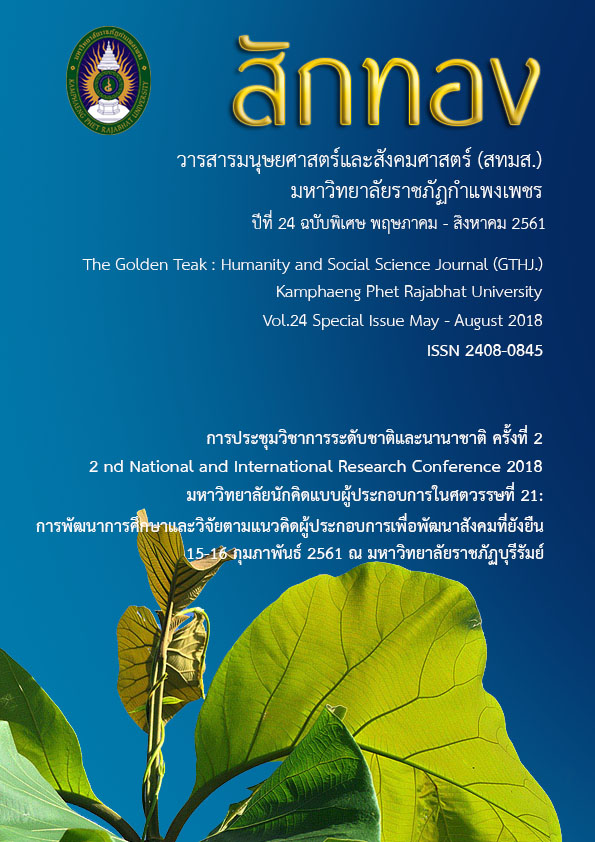The Development of Ethical Leadership Indicators for Upright School Administators
Main Article Content
Abstract
The purposes of this research were to develop and validate the indicators of ethical leadership for Upright School administators. This research and development consisted of 3 phases. Firstly, factors and indicators of ethical leadership for Upright School principals were established by research documentations, focus group discussion among the professional of the university, secondary school and primary school administators and ethical key persons to validate the factors and indicators, trying out factors and indicators by the experts among lecturers about ethical leadership in universities, principals, teachers in secondary schools and primary schools, and supervisors who worked with the Upright School projects. Secondly, construct validity of factors and indicators of ethical leadership was verified by the confirmatory factor analysis model. Finally, the criteria and a manual for measuring and evaluating ethical leadership were developed. The research findings showed that there were seven factors of the indicators of ethical leadership for Upright School principals: the critical thinking processes with 3 indicators, the ethical decision with 2 indicators, the discipline and the fairness with 3 indicators, the honesty with 3 indicators, the sufficiency with 3 indicators, the public mind with 3 indicators, and the team creation with 5 indicators. In addition, the validation of the model indicated that the model corresponded to the empirical data with 122.32 = 0.97, P = 0.576, df=126, GFI= 0.979, AGFI=0.958, RMR = 0.00269 and RMSEA = 0.000., with the highest mean on the discipline and the fairness, the honesty, the ethical decision, the team creation, the critical thinking processes, the sufficiency, and the public mind, respectively. As for the criteria for measuring the ethical leadership for Upright School principals, there were 3 levels: the low elevel (norm statistics score lower than 93.1) the fair level (from 93.1 to 108.9), and the high level (over 108.9). The result of the evaluating handbook on the ethical leadership for Upright School principals was at a highest level.
Article Details
บทความที่ได้รับการตีพิมพ์เป็นลิขสิทธิ์ของวารสาร สักทอง : วารสารมนุษยศาสตร์และสังคมศาสตร์ สถาบันวิจัยและพัฒนา มหาวิทยาลับราชภัฏกำแพงเพชร
ข้อคิดเห็นใดๆ ที่ปรากฎในวารสารเป็นวรรณกรรมของผู้เขียนโดยเฉพาะ ซึ่งมหาวิทยาลัยราชภัฏกำแพงเพชรและบรรณาธิการไม่จำเป็นต้องเห็นด้วย
References
_______. (2015). Upright Schools standard. Bangkok : Office of the Basic Education Commission : OBEC.
Chaichompu, S. (2014, April- September). Ethical Leadership in School Administration. Journal of Educational Administration Burapha University, 28(2), 1-15.
Grace. (2014). The Four V’s of Ethical Leadership. [Online]. Avaliable : https://sites.psu.edu/leadership/2014/04/27/the-four-vs-of-ethical-leadership/ [2016, April 24].
Keller, R.T. (2006, January). Transformational leadership, initiating structure, and substitutes for leadership : a longitudinal study of research and development project team performance. Journal of Applied Psychology, 91(1), 202-210.
Manyat, S. (2011). A Structural Equation Model of Factors Affecting Ethical Leadership of School Administrators under the Department of Local
Administration. dissertation (Educational Administration) Khon Kaen University.
Mowbray, D. (2009). The MAS Code for Ethical Leadership. [Online]. Avaliable : https:// www.mas.org.uk. [2016, Febuary,18].
Northouse, P.G. (2013). Leadership Theory and Practice. (6 th ed.). California : SAGE Publications, Inc,.
Office of the Basic Education Commission (OBEC). (2016). Policy of the Office of Basic Education Commission, Fiscal Year 2016. Bangkok : Office of the Basic Education Commission
The National Anti-Corruption Commission (NACC). (2014). National Anti-Corruption Strategy Phase 3 (2017-2021). Office of the National Anti-Corruption Commission.
Thongkamhaeng, K. (2012). Strategies for The Development of Moral Leadership for Private School Administrators. dissertation (Educational Administration).
Chulalongkorn University.
Wiratchai, N. (1999). LISREL Model : Analytical Statistics for Research. (3 rd ed.). Bangkok : Chulalongkorn University.


